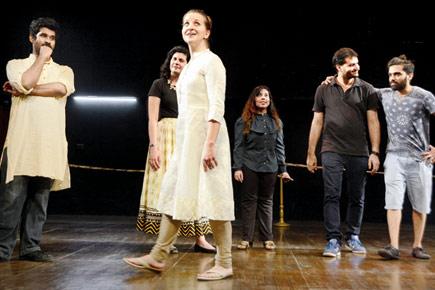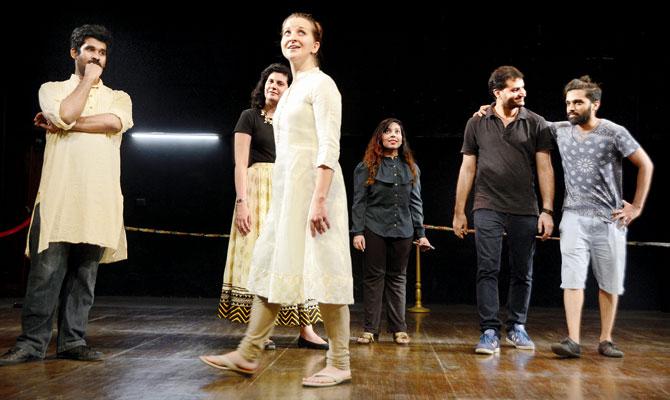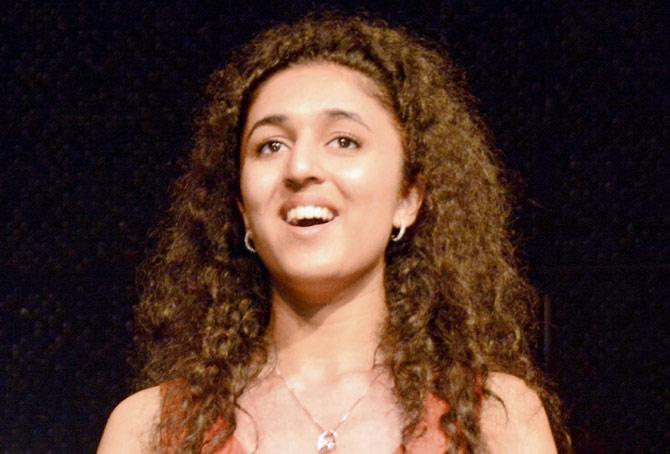A secret romance and a dowry-obsessed Count — all the intrigue, comedy and music at Royal Opera House's first full-length, all-Indian opera


Anna Bychkova Nair (centre, in white kurta), who plays the role of Carolina, and other members of the cast at a rehearsal of Il Matrimonio Segreto. The opera has two sets of cast. PICS/SNEHA KHARABE
ADVERTISEMENT
Excitement and nervousness mingle in equal parts on the stage of Charni Road's Royal Opera House. A sound check is in progress for Il Matrimonio Segreto, with the cast trying out their arias while director Rehaan Engineer looks on. There is some concern from the cast and Engineer on whether the acoustics of the recently-restored opera house will cooperate — a full house, the hum of the AC units, the modest orchestra pit — all have to be taken into account to make sure that the lilting voices are not drowned out. We don't think of logistics enough when we think of opera though. And, why should we? For, as the hall fills up with the voices of the sopranos and the baritones, we are effortlessly transported to a time gone by. A scene from Pretty Woman — Vivian tearing up over La Traviata — flashes briefly before our eyes.
This month-end will be a momentous one for Royal Opera House owned by the royal family of Gondal. Il Matrimonio Segreto will be the first full-length opera to be performed at the venue since it closed down to the public in 1993. Of course, opera was long-forgotten here — at India's only opera theatre — as celluloid claimed its followers. Adding to this occasion is the choice of the opera itself. Il Matrimonio Segreto, or The Secret Marriage, has been a popular piece right since it was first-performed in 1792 at the Imperial Hofburg Theatre in Vienna. With music by Domenico Cimarosa and a libretto by Giovanni Bertati, Il Matrimonio Segreto rivalled with Mozart's pieces successfully across theatres in Europe. And, lastly, the upcoming performance has a an all-Indian cast.

Natasha Agarwal plays the role of the younger sister, Carolina
"It is absolutely historic," is how Mark Troop puts it when we meet the cast and directors before rehearsals. Troop, an accomplished pianist, and Patricia Rozario, an internationally-renowned soprano, are music directors for the upcoming performance.
"Il Matrimonio Segreto is lively and light with funny characters," says Rozario, adding, "Its music is easy to grasp and enjoy, and it's a good way to ease people into opera before we take on Mozart."
Vocal observations aside, the music directors say that Il Matrimonio Segreto has a dash of Bollywood as well. A comedy of errors and a comedy of manners, Il Matrimonio Segreto was adapted from an English play by George Colman the Elder and David Garrick called The Clandestine Marriage. It revolves around two sisters, Elisetta and Carolina, of which the latter is secretly married to their father's secretary. When a Count comes seeking Carolina's hand in marriage, instead of the elder Elisetta's, things start getting complicated. "The opera obsesses over marriage and has farcical situations. There is even a whole comical situation revolving the dowry," says Rozario, adding that Engineer is keen on a non-representative staging without period costume. What's more, players from the Symphony Orchestra of India will be helming the music.
Rozario and Troop together run Giving Voice Society, an initiative that trains singers and provides opportunities for the talented. Their association with the world of opera has been a long-standing one. Earlier, the society produced two performances, an operetta titled The Little Sweep and an opera, Dido and Aeneas. And, while both of them train singers in opera, Rozario was part of the inaugural weekend of the restored Royal Opera House in October last year, when she sang a 30-minute programme of opera arias and songs with her husband, Troop, at the piano.
For Mumbai audiences, this opera is sure to be a refreshing addition to the cultural map. In fact, even when Il Matrimonio Segreto was first performed, it was such a roaring hit that Emperor Leopold II demanded an encore. It gave Cimarosa's piece, rather than Mozart's, the reputation of having the longest encore in operatic
history. Will Mumbai audiences be as demanding? We certainly hope so.
 Subscribe today by clicking the link and stay updated with the latest news!" Click here!
Subscribe today by clicking the link and stay updated with the latest news!" Click here!






